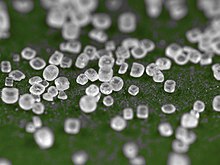Salt (proper noun) /sɔːlt/
A village in Staffordshire, England.
salt (noun) /sɑlt/, [sɑɫt], [sɑɫʔ]

A common substance, chemically consisting mainly of sodium chloride (NaCl), used extensively as a condiment and preservative.
(chemistry) One of the compounds formed from the reaction of an acid with a base, where a positive ion replaces a hydrogen of the acid.
(uncommon) A salt marsh, a saline marsh at the shore of a sea.
(slang) A sailor .
(cryptography) Randomly chosen bytes added to a plaintext message prior to encrypting or hashing it, in order to render brute-force decryption more difficult.
A person who seeks employment at a company in order to (once employed by it) help unionize it.
(historical, in the plural) Epsom salts or other salt used as a medicine.
(figurative) Skepticism and common sense.
(Internet slang) Tears; indignation; outrage; arguing.
(UK, historical) The money demanded by Eton schoolboys during the montem.
One who joins a workplace for the purpose of unionizing it.
salt (verb) /sɑlt/, [sɑɫt], [sɑɫʔ]
(transitive) To add salt to.
(intransitive) To deposit salt as a saline solution.
(nautical, of a ship) To fill with salt between the timbers and planks for the preservation of the timber.
Insert or inject something into an object to give it properties it would not naturally have, such as blasting metal to appear productive, adding bogus evidence to an archaeological site, or adding certain chemical elements to a weapon to generate more radiation.
(transitive) To sprinkle throughout.
(cryptography) To add filler bytes before encrypting, in order to make brute-force decryption more resource-intensive.
Render a thing useless, sow with salt symbolizing a curse on land, and lock a page title to prevent its creation.
salt (adjective) /sɑlt/, [sɑɫt], [sɑɫʔ]
Salty; salted.
Saline.
Related to salt deposits, excavation, processing or use.